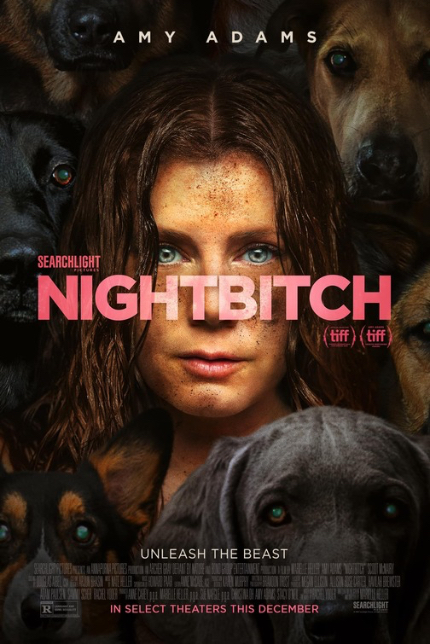NIGHTBITCH Review: Amy Adams Elevates An Otherwise Underwritten Script

Inarguably one of the most talented, hard-working, and almost as importantly, most popular performers of her generation, Amy Adams, has yet to win an Academy Award.
As her six (and counting) Oscar nods attest, however, it's not for lack of trying or recognition from her peers. Despite that recognition, her range, depth, and charm have yet to find the perfect role to elevate her from longtime nominee to winner in either the Best Actress or Best Supporting Actress categories.
Her latest role finds her in Marielle Heller's (A Beautiful Day in the Neighborhood, Can You Ever Forgive Me?, The Diary of a Teenage Girl) defanged adaptation of Rachel Yoder's well-received dark-fantasy novel, Nightbitch. Adams persuasively plays the unnamed title character, identified only as "Mother" in Yoder's novel and in the film adaptation based on her novel.
An artist, art curator, and gallery owner, Mother gave up her creative ambitions for a materially comfortable, if emotionally and spiritually unfulfilling, marriage to an unnamed Husband (Scott McNairy) and stay-at-home mother to a rambunctious two-year-old (Arleigh and Emmett Snowden). She is increasingly frustrated by a rote, routine life filled with duties, obligations, and caretaking, and little, if any time for herself or her needs.
Heller reveals Mother's turbulent inner life through a disarmingly direct-to-camera monologue. It's pure fantasy – or rather a reflection of Mother's subjectivity through seemingly objective means – but it's the first clue of many of what audiences can expect from Nightbitch, some surface-deep challenging, some blackly humorous, and most of it painfully obvious to anyone with even a passing comprehension of first-wave feminism and the multiple waves that followed.
Still, it's stirring enough and delivered with sufficient conviction to place audiences on Mother's side. At least in part, we can understand her frustrations, doubts about the life-decisions she made in the past and their current consequences, and reservations about her roles and identities as a mother and wife.
Mother reacts with consternation when she forgets it's Book Babies Day at the local library, squirming when forced to make small talk with the other mothers, and eager to bolt for the door when the opportunity arises. At home, she's practically a single mom. Her husband travels frequently, only stopping by for short stays and weekends, all but ignoring his wife's subtle and not-so-subtle pleas for help, conversation, or any attempt to rebalance parenting time.
With frustrations boiling over into equal parts rage and despair, Mother -- and the film she leads -- takes a modest, under-realized turn into Cronenbergian body-horror. Mother begins to notice odd physical changes, including seemingly sharper canines, a tuft of newly grown hair at the base of her spine, and a heightened sense of smell. She also develops a taste for raw, uncooked meat.
Even as her fantasies of self- or re-empowerment threaten to scuttle her relationships, she begins to notice a trio of attendant canines waiting for her outside her home or the nearby public park where she spends her afternoons with her son, their presence an invitation into a newer (or depending on your perspective, older) life as a dog, living by and for the moment, reveling in the company of other canines, and living as part of a pack, her worries, concerns, and anxieties non-existent as primitive instincts take precedence over thought and reflection.
Heller plays Mother's transformation into a four-legged pack animal as a metaphor turned literal – and later still, back to an effective, if thinly explored metaphor – before turning a tale of self-exploration and self-actualization (i.e., one of transformation) into an unfathomably unearned story of reconciliation with motherhood and marriage, in effect taking the safe, even reactionary way out of a story with the tantalizing potential for a far more radical, provocative denouement. In the end, all the questioning of socially constructed, hierarchical gender roles leads nowhere or to be more specific, straight back to an unsatisfying beginning.
Despite the early promise, specifically a scene involving Mother's self-examination of her rapidly mutating body, Nightbitch eschews the more extreme, gorier aspects of the body-horror genre, opting instead for a blink-and-you'll-miss-it transformation scene (and back again). It's part and parcel of Heller's disappointingly deliberate choice to soft-sell a potent metaphor, an endlessly malleable metaphor explored in countless European and non-European folk tales, short stories, and films, most ending in tragedy, some ending with the recognition that the protagonist, for all their desire to belong to a community of hairless, bipedal primates, can't and must either live entirely outside society or perish in the attempt.
Nightbitch opens today, only in movie theaters, via Searchlight Pictures.
Nightbitch
Director(s)
- Marielle Heller
Writer(s)
- Marielle Heller
- Rachel Yoder
Cast
- Amy Adams
- Scoot McNairy
- Arleigh Snowden







